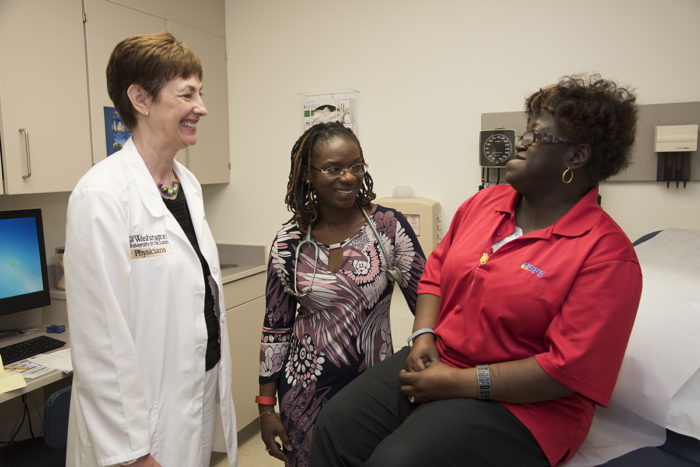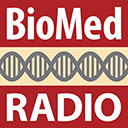Study aims to find clues to breast cancer outcomes in African-American women
Most past genetic research has analyzed DNA from women of European ancestry
 Robert Boston
Robert BostonWashington University School of Medicine's Laura Jean Bierut, MD (left), and Foluso Ademuyiwa, MD (center), discuss genetic risks for breast cancer with patient Delores Ford-Dixon. Bierut and Ademuyiwa are launching a study in African-American women with breast cancer to learn whether their genetic risks are influenced by the same mutations that affect white women or are altogether different.

Scientists’ understanding of the genetic roots of breast cancer is based largely on research conducted in women of European ancestry.
That knowledge does little to help explain why African-American women with the disease are more likely to be diagnosed at younger ages and with more aggressive tumors than their white counterparts. They also die of breast cancer at higher rates.
Now, researchers at Washington University School of Medicine in St. Louis are launching a major study in African-American women with breast cancer to learn whether their genetic risks are influenced by the same mutations that affect white women or are altogether different mutations. Such information may lead to new ways to prevent or treat breast cancer in African-American women.
“We’ve had a revolution in genetic testing over the past 10 years,” said the study’s senior investigator, Laura Jean Bierut, MD, the Alumni Endowed Professor of Psychiatry. “We’ve been able to identify many gene variants that contribute to a variety of cancers, including breast cancer. But as you examine the data, you realize most of these studies have been done in populations of European ancestry and that we don’t understand very much about the genetic causes of cancer in other populations, particularly in African-American women.”
According to the National Cancer Institute, African-American women with breast cancer often are diagnosed with the disease at younger ages, and they have a higher incidence of a particularly aggressive form of breast cancer, called the triple-negative subtype, than women from other racial and ethnic groups.
“Better understanding of the genetics of the disease in African-American women could be very helpful in earlier diagnosis, prevention and treatment,” said co-investigator Foluso Ademuyiwa, MD, an assistant professor of medicine in the Division of Medical Oncology.
In this new study, the researchers will enroll African-American women who have had breast cancer, regardless of when their diagnoses occurred. Bierut, who serves as the principal investigator of several national genetic studies, has teamed with Ademuyiwa and other researchers at the Siteman Cancer Center at Barnes-Jewish Hospital and Washington University School of Medicine to analyze the participants’ DNA.
At the same time, the National Institutes of Health (NIH) is launching a study to investigate how genetic and biological factors contribute to breast cancer risk in black women. As part of that study, researchers will compare the genomes of African-American women with breast cancer to the genomes of black women who don’t have the disease and to the genomes of white women who do. That study will share specimens, data and resources from 18 previous studies.
The Washington University study will gather and analyze new DNA samples from African-American women diagnosed with breast cancer. The researchers will conduct brief surveys with study volunteers to learn about their risk factors for breast cancer, such as family history, hormonal treatments the women may have undergone, and the number of children each may have had. After each interview, study volunteers will provide the researchers with two saliva samples to be sent to one of two commercial genomics companies for sequencing.
The companies—Color Genomics and 23andMe Inc.—will test each woman’s DNA. Data from Color Genomics will be used by researchers to provide study participants with an opportunity to find out what the genetic testing determines about the risk factors for breast cancer each woman carries.
Participants who receive this information from Color Genomics will be offered genetic counseling and will be contacted about three months after the initial survey with some follow-up questions to learn whether they have shared the findings with their physicians or with family members who also may have similar genetic risks for breast cancer. Although 23andMe does not provide breast cancer risk interpretation in its product, data from the test will be used to research this area further.
“Testing has become so easy that we don’t even need to do a blood draw,” Bierut said. “With saliva samples, we can analyze a woman’s DNA and take a look at known genetic variants that contribute to breast cancer. We also expect to find other, previously unidentified genetic variants specific to African-American populations. Our main goal is to improve diagnosis and treatment for these women.”
The study’s initial phase will involve only women in the St. Louis area. For more information, or to volunteer for the study, call 314-286-1393 or e-mail abcgenetics@wustl.edu.







